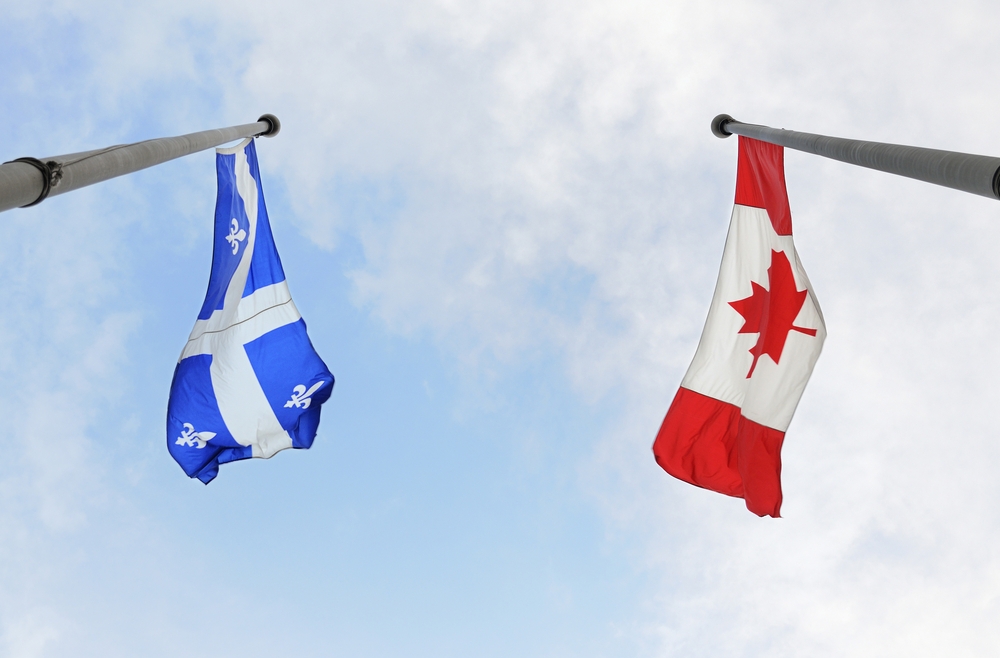on parle

Sunshine, festivals, and summer delights
June 2024
As the sun shines over our terraces and birdsong mingles with the summer breeze, we’re delighted to greet you with another edition of Dispatch. ‘Tis the season for festivals, family barbecues and beach getaways — the perfect time to celebrate joie de vivre à la québécoise! When it comes to advertising, communications and culture, here’s what you should know (in our humble opinion).
Pour yourself a cool drink, kick back on your balcony and enjoy!
- Emilie Maranda, Director of Culture & Communications

At last, a productive detour!
It cannot be stressed enough that advertising in Québec requires a deep understanding of the local culture. Quebecers are attached to their distinct identity, and expect the content they see to reflect their cultural and social realities.
So, where do you begin? A good place to start involves looking at how the rules and regulations on advertising are established in Québec, from laws that enshrine the status of artists and protect language to policies enacted by the consumer protection agency (l’organisme de la protection du consommateur) and restrictions on advertising to children. All of these laws, in their own way, reflect the fundamental values of Québecs and offer an invaluable source of guidance.
Nevertheless, this legal labyrinth can quickly become a constraint that stifles creativity, marketing decisions or campaign production. Viewed as a legal framework, such restrictions turn into an ingenious guide that makes every word choice, concept and decision a little smarter, more precise and more authentic to the general public. It’s a process we need to trust, and one that pays off.
Working with local talent and in the local language, while protecting heritage for future generations and respecting the values and social responsibilities present in Québec, are key elements in building an effective and respectful advertising campaign. With this spirit, brands can positively contribute to Québec’s popular culture.
Now that we’re all well-equipped, let’s get to work!
- Jennifer Lankry, producer

Quebecois French: A strange bird (aka un drôle de moineau!)
I’ll always remember the first time I noticed differences in our language. It was in 2008, on my first trip to France. Here’s a quick recap: I saw a beautiful scarf on display in a Parisian boutique, so I went inside to look for the price on the mannequin. When the store clerk asked if she could assist me, I said: "I’d like to know the price of unfoulard, please," to which she replied, "Do you mean uneécharpe?" It was a scenario reminiscent of the butter scene in the film Elvis Gratton II. It was also the first time I had ever been corrected by a French person, which is even harder to digest while speaking my mother tongue. A sense of insecurity set in, leading me to wonder: How well do I speak French, actually? Do the French speak better than Quebecers? Are we inferior to the French from France? It affects our Québec identity and sows doubts about our worth. A few days later, I visited the Château de Versailles with my family and requested a self-guided tour. We were given the German version. I thought to myself, "Wow, we sure speak great French, don’t we?" I came away from the trip feeling self-conscious about speaking French—a feeling shared by many Quebecers for a long time, even today.
Last spring, a viral video of renowned Québec host Joël Legendre singing on Soirée canadienne in the late 1970s resurfaced on social media. The video caused quite a stir—and not a positive one. Many people took to the Internet to mock and ridicule the Québec language as if we were inferior. The episode really touched on the social aspect of language, and once again, it struck a chord with Quebecers. It’s all about perception. The differences in vocabulary between Québec French and French from France are often fodder for clichés and stereotypes. What's important to remember is that the language spoken in Québec is not worse or better than French in France: It's just different. There is no such thing as the "best French." Our language reflects our history. We should embrace the difference and celebrate the richness and diversity of la langue québécoise. It’s what makes us unique and the source of our local pride.
When it comes to advertising, heightened cultural and linguistic sensitivity is required when developing campaigns for Québec audiences. At The French shop, localization starts with our seven filters, the first and foremost of which is typically language. Using a "queb" expression in a slogan, for instance, resonates powerfully with the Québec public, and by extension, honours our multifaceted language.
P.S. I still say "un foulard."
- Isabelle Pelletier, social media manager

Desjardins, the Queen and the Patriots
Desjardins, a caisses populaires cooperative widely regarded as a paragon of Québec-rooted success, recently displayed a poster in some of its branches depicting a man with a Canadian flag draped over his shoulders. Controversy quickly followed in Québec. Media outlets and politicians shared their reactions to the poster, prompting the financial institution to issue an apology explaining that the artwork in question had not been approved by Mouvement Desjardins. From an outsider’s perspective, it may seem surprising that such an innocuous image could provoke such a strong reaction. Once again, it’s a prime example of how important it is for brands to understand the Québec market. A lack of sensitivity to the province's language and history can seriously undermine a brand’s relationship with the local population.
In this case, the context and timing of when the posters went up is key. These particular posters were used to announce branch closures on May 20th, a holiday that epitomizes the duality between Québec and the rest of Canada. While most Canadians celebrate Victoria Day in honour of the Queen, those in la belle province observe la Journée nationale des patriotes (National Patriots’ Day). On its face, the difference may seem trivial or even incidental, but it represents one of the many subtle differences between Québec and other parts of Canada. In Québec, this holiday is an important celebration of the province’s history and culture. Historically, the holiday commemorates the struggle for democratic rights and freedoms, and the promotion of Québec identity. The Queen, on the other hand, is not a cherished figure in Québec. For many, she's a symbol of oppression.
It is important to note, however, that this recent controversy is not indicative of a hatred toward Canada shared by the province as a whole. Rather, it’s demonstrative of a heightened sensitivity around certain topics. For Quebecers, Desjardins’ choice of visual for this occasion was perceived as an affront.
Whether the error was a lack of internal communications or a lack of consideration for Québec sensitivities, the controversy is an important reminder that brand communications should be consistent at every touchpoint, whether a national campaign or temporary in-branch poster.
- Mathieu Rolland, senior copywriter

Anglicisms in French: pourquoi pas?
"On est en live," "j’ai une date," "le highlight de ma soirée," "un podcast": These are just a few of the loanwords and expressions borrowed from English that have found their way into the French vernacular. Whether in advertisements, TV shows or on the radio, publishers use such anglicisms to connect with their audience. While audiences in Québec are familiar with these words and use them in everyday conversation, it’s collectively understood that they are adopted from English. So it’s worth asking why we use them when there are equally adequate French equivalents. The use of anglicisms has caused concern among some linguists, who argue that French terms should be privileged in order to preserve the language in Québec. Others contend that anglicisms are an important part of Québec’s cultural identity, and that it’s necessary to incorporate them into media to make meaningful connections with the public.
We should start by assessing the potential negative impact of the excessive use of English in French-language media. TV shows or podcasts that borrow from English are sometimes accused of linguistic laziness. Very often, the people using anglicisms like "je feel," "a roast," or "hot seat" are fluent in French. While these linguistic appropriations demonstrate the elasticity of language, we have to ask ourselves when the use of English terms is and isn’t justifiable.
For instance, anglicisms are justifiable when they are essential to reaching a target audience. In communications, it’s important to understand cultural nuances — including those related to language — to establish a real connection with an intended audience. Terms and phrases like "by the way" (soit dit en passant), "job" (travail), "chum" (copain), "meeting" (réunion) are commonly used by people of all ages in Québec. By understanding and paying close attention to these linguistic subtleties, advertisers not only reinforce the authenticity of their messages, but also reinforce their ties with the Québec audience. English words and turns of phrase often lend a fresh, dynamic edge to messages, and can also make text more punchy and concise. In the Le Devoir article "La force de l'anglicisme," Claude Vaillancourt notes that a "deep" person is superior to one who is merely "profonde." Ending a sentence with "fine!" is cooler and trendier than the French word "bien!". It’s perfectly acceptable to use anglicisms, as long as their use is justifiable and serves a specific purpose. At the same time, we should always stay mindful of the French equivalents.
- Justine Cardinal-Hamelin, account manager

A Campaign That’s All That and a Bag of Chips
Quiz time! What’s America’s favourite Ruffles flavour? Cheddar and Sour Cream! You’re probably thinking, “Come on, we don’t even have that flavour here. Besides, everyone knows the best Ruffles flavour is All Dressed.” We thought the same thing at TFS when the strategy team at Motive (our partner agency for the PepsiCo consortium, which owns Ruffles, among other brands) shared this unusual fact.
That said, Canadians who are fond of the crinkle-cut potato chips will finally be able to take part in this heated debate, as Ruffles has some mouth-watering news: the company is about to launch a new flavour in Canada, the one that makes our neighbours to the south drool. You guessed it: Cheddar and Sour Cream is in da house!
In view of the big launch, Motive approached TFS to adapt the creative campaign to the Québec market. The goal was to engage consumers and spark discussion about the best Ruffles flavour of all time. Motive developed The Greatest Ruffles of All Time (aka G.R.O.A.T.) campaign, a play on the trending acronym G.O.A.T.
Why did we adapt rather than translate? First, we absolutely wanted to avoid a disastrous mistranslation like the one from the Columbia Sportswear campaign “Soyez la chèvre” (Be the goat), displayed on the storefront of The Bay in Montreal. We also had to find an “acronymable” equivalent in French that would convey the meaning “greatest of all time” and speak to Generation Z consumers (Québécois aged 18-24) – the campaign’s target audience.
The issue is that, in French, the few acronyms used by the general public either represent the names of institutions (e.g., CÉGEP for Collège d’éducation générale et professionnelle, SAQ for Société des alcools du Québec, or CLSC for Centre local de services communautaires), or they are English expressions (LOL, BYOB, ASAP, YOLO). I decided to tackle this delicious challenge by inventing a G.R.O.A.T.-style acronym and activating my brain in reverse-engineering mode: taking an existing French word meaning “best,” transforming it into an acronym by adding periods between each letter, then creating a phrase to fit the acronym.
The result? Saveur qui fait Tripper les Accros de Ruffles, or S.T.A.R.! This option won the hearts of our clients because it includes the brand name, speaks to young audiences through colloquial language, and incorporates a widely-used Québecism, the verb “tripper.” In short, it’s a perfect example of the type of localization that makes TFS very proud!
And so, we ask you: Which flavour is the S.T.A.R.? Spoiler alert: each and every one of them!
- Béatrice Rea, Copywriter
